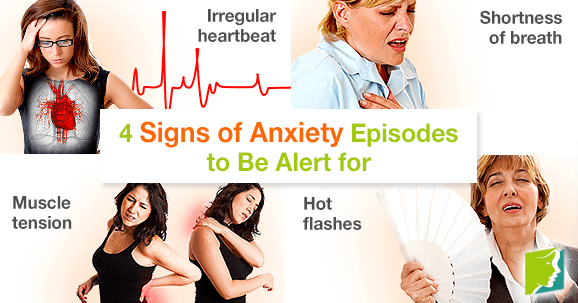Anxiety is more than just a couple of worries that come and go - it is a health condition. People who suffer from chronic anxiety are not only caught up in concerns, they also experience bodily reactions to obsessive thinking. It can negatively impact a sufferer's life in so many ways, both personally and professionally. For this reason, it is important to know the signs of anxiety in order to treat it.
Irregular Heartbeat
Irregular heartbeat, or arrhythmia, occurs when electrical signals that regulate heartbeat are blocked. When someone holds a lot of emotional stress, it directly affects their brain chemistry. Endorphin levels decrease, while cortisol, the stress hormone, increases. This can raise levels of adrenaline in the body, which may cause your blood pressure to rise and your heart to pump more quickly or erratically. Although this condition is usually harmless, if it's ongoing, it can lead to a heart attack, coronary heart disease, or heart failure.
Shortness of Breath
Shortness of breath is another sign of anxiety, characterized by shallow inhales and exhales due to emotional distress. When your brain or muscles do not receive enough oxygen, you may experience breathlessness. The lack of oxygen can also cause dizziness and even faintness. In the case of an anxiety attack, it is important to remind yourself to breathe deeply. Daily therapeutic breathing is known to reduce stress levels.
Muscle Tension
When your mind is stressed out, it begins to show in your body. Worrisome thoughts and a lack of relaxation can start to build up in certain areas, such as the hips, shoulders, and forehead. This can lead to aches, pain, and over time, even injury. Keep your muscles and joints relaxed by stretching and relaxing them at the start and end of each day, in conjunction with deep breathing exercises.
Hot Flashes
A main trigger for hot flashes - another common sign of menopause - is anxiety. When you are stressed out, it can double the effects of your hot flashes. This includes shortness of breath and irregular heartbeat, as mentioned above, but also comes with increased body temperature and sometimes feelings of panic.
Understand that although these signs of anxiety can be intense and overwhelming, there is always a way to overcome them. The first step to relief is knowing that the source of your shallow breathing, irregular heartbeat, muscle tension, and hot flashes is anxiety. From there, you can work on stress-relieving techniques to rebalance your body and mind.
For further information on how to treat anxiety during menopause follow the link below.
Sources
- National Heart, Lung, and Blood Institute. (2011). What Is an Arrhythmia? Retrieved May 2, 2014, from http://www.nhlbi.nih.gov/health/health-topics/topics/arr/
- National Institutes of Health. (2013). Breathing Difficulty: MedlinePlus Medical Encyclopedia. Retrieved May 2, 2014, from http://www.nlm.nih.gov/medlineplus/ency/article/003075.htm
- University of Maryland Medical Center. (2013). Anxiety disorders. Retrieved May 2, 2014, from http://umm.edu/health/medical/reports/articles/anxiety-disorders




